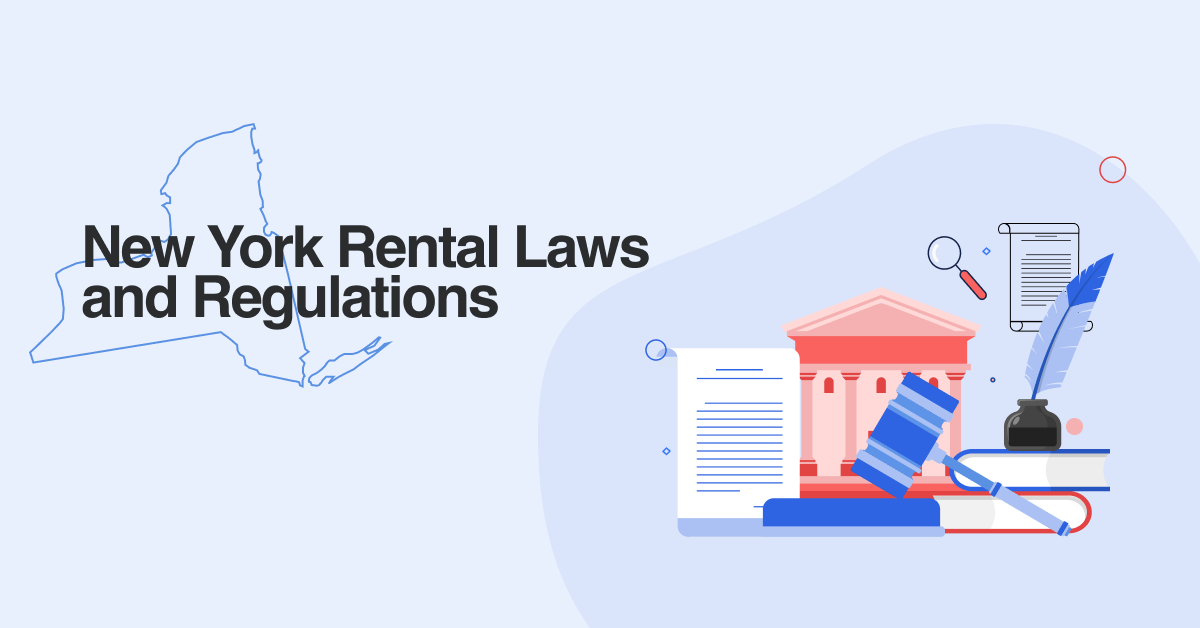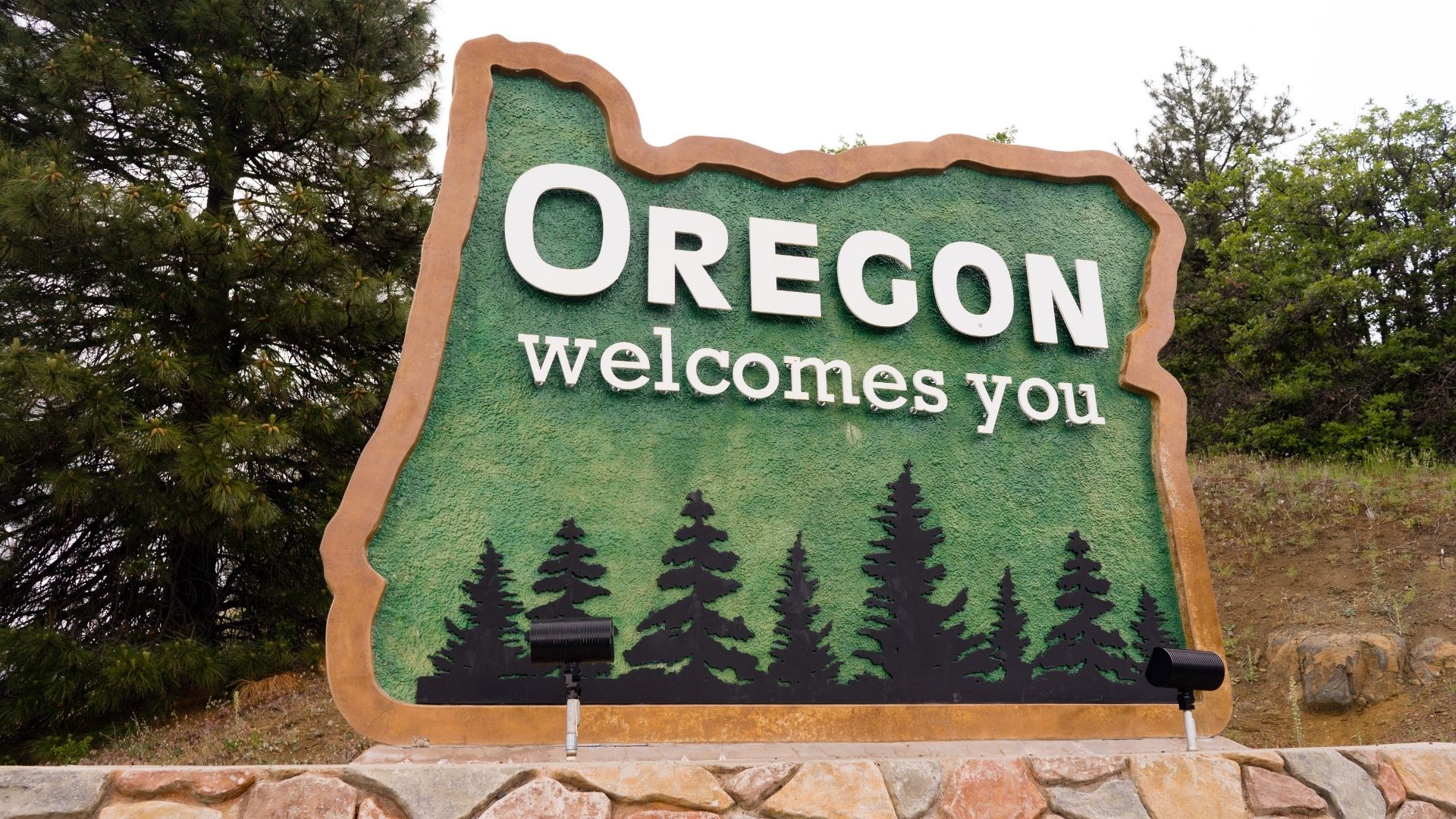
Disclaimer: This article doesn’t constitute legal advice, and landlords should not substitute this information for professional legal advice.
If you’re in search of help navigating New York rental laws and regulations, we’ve pulled together a guide with some of the key points you should know.
New York is considered a landlord-friendly state, but both property owners and renters have rights and responsibilities. Renters are responsible for paying on time and keeping the property in good condition. Landlords must maintain safe, livable conditions for properties and abide by rent control legislation.
A guide to New York rental laws and regulations
- Leases, rent, and fees
- Security deposits
- Notices and entry
- Utilities
- Rent control and stabilization
- Pet laws
- Low-income housing
- Disclosures
- Eviction
- Court info
- Resources
- FAQs
Leases, rent, and fees in New York
New York lease periods
When you have short-term renters, you aren’t required to sign a written lease agreement. For rentals that are a year or longer, you need a written lease. However, it’s always in your best interest to put an agreement in writing to avoid conflict with renters, regardless of the length of their stay.
What to include in a New York lease
- Monthly payment amount
- Rent due date
- Where to pay rent, which is typically the landlord’s address
- How to pay rent, including acceptable payment methods
- Any additional fees for bounced checks
- What happens if renters pay after the due date, such as late fees or lease termination
- Any warning you have to provide before issuing a rent increase
After signing the lease, be sure to provide renters with a copy of the agreement within 30 days. You’re also required to give renters a receipt when they make a payment.
When setting a monthly rent payment, make sure you know whether your property is subject to rent control regulations. Although rent-controlled units are most common in New York City, the New York State Division of Housing and Community Renewal handles all rates and increases. As a general rule, pre-1974 buildings with six or more units may be subject to rent control.
Late fees
If renters neglect to pay on time, you aren’t required to offer a grace period in New York state. Instead, you can begin charging a late fee or take other actions as long as you state the fee and any other consequences in the rental agreement.
Withholding rent
In some cases, renters are legally allowed to withhold rent. For example, if you neglect to complete essential repairs, such as fixing the unit’s heating system, your renters can arrange for the repairs themselves and deduct the cost from their rent payment.
Adjusting rent prices
If you plan to adjust rent prices for your properties, keep in mind that you can only do so at the end of one lease or the beginning of another. In New York, rent increase notices are essential if you plan to increase rent by more than 5%. State law requires you to provide advance notice.
- Give 30 days’ notice to renters of at least a year
- Give 60 days’ notice to renters of one to two years
- Give 90 days’ notice to renters of more than two years
Additional restrictions on rent increases also apply:
- You cannot raise rent for discriminatory purposes
- You cannot raise rent in retaliation for renters filing a complaint against you
- If your units are subject to rent control, you have additional limitations to your rent increases
Security deposits and deposit management in New York
New York has relatively strict security deposit regulations.
How much you can charge for a security deposit
Landlords can charge renters up to the equivalent of one month’s rent as a security deposit (dwellings that are subject to the New York City Rent and Rehabilitation Law or the Emergency Housing Rent Control Law may have different security deposit limits).
Holding security deposits
If you hold the security deposit in a bank account, state law requires you to disclose the amount and the financial institution’s contact information.
Interest regulations
If you own non-regulated units in a building with six or more units, you’re also required to pay interest on the deposit.
You have three options to handle interest payments:
- Credit renters’ payments at the end of the lease
- Pay the sum to each renter at the end of the lease
- Pay the total amount to each renter when they move out
Commingling security deposits with other assets
When you hold a security deposit, state law prevents you from commingling it with other assets. That means you can’t keep it in a personal bank account or spend it on unrelated expenses.
Retaining part of the deposit
New York state law allows you to retain 1% of the security deposit each year. This serves as an administrative fee that you can put toward the cost of holding the deposit.
Returning security deposits
After renters move out, you have up to 14 days to return the security deposit.
If you plan to withhold all or part of the deposit, you have to tell renters in advance. New York limits the reasons you can deduct from the security deposit; In most cases, for unpaid rent or to repair damages in excess of typical wear and tear.
What happens if renters leave their belongings behind after moving out?
In the event that renters leave behind belongings, you can’t sell or throw them away. It’s the landlord’s responsibility to store them safely. Most New York landlords give renters 30 days after the move-out date to collect any remaining belongings.
Notices and entry regulations
You must give reasonable prior notice and enter at a reasonable time with the renter’s consent, either to provide agreed-upon or routine services or repairs or in accordance with lease terms. A reasonable time is generally considered between 9 a.m. and 5 p.m. on weekdays.
In the event of an emergency, such as a fire or water leak, you don’t need to provide notice and can enter without the renter’s consent.
New York utilities laws
You aren’t allowed to shut off utilities in occupied units. If you want to evict renters, you have to file a notice with your local court instead.
Rent control and stabilization
Various communities in New York state have rent regulation programs. These programs are known as rent control and rent stabilization, and they are administered by the state’s Office of Rent Administration.
Rent control
If a landlord owns a rent-controlled property, the landlord may charge a specific amount for rent. Rent control acts as a price ceiling. The program applies to residential buildings that were constructed prior to February 1947. The renter or the renter’s lawful successor (for example, family member, spouse, adult lifetime partner) must be living in the unit continuously since before July 1, 1971, for rent control to apply.
Rent control is in effect in:
- New York City
- Albany County
- Erie County
- Nassau County
- Rensselaer County
- Schenectady County
- Westchester County
Once a renter vacates a rent-controlled unit in New York City and most other areas, the unit becomes rent-stabilized or is completely removed from regulation.
Rent stabilization
- Applies to buildings before 1974 and have more than six units
- Limits how much a landlord can increase rent each year
- Guarantees renters the right to renew their lease
When can renters leave a lease without penalty?
You should also keep in mind that, in some cases, renters may end a lease early with no penalty. In these situations, renters have the right to break a lease:
- The renter becomes a victim of domestic violence
- The renter must leave to perform active military duty
- The renter is at least 62 years old and must relocate to a nursing or assisted living facility
- You neglect to provide a safe, habitable dwelling
- You harass the renter or otherwise violate their privacy
New York pet laws
New York state law doesn’t require landlords to accept pets, but you can allow them at your discretion.
If a renter has a disability that requires a service animals, you must accommodate them.
Low income housing
The Section 8 Housing Assistance Payments program, a federal rent and mortgage subsidy program, assists eligible:
- Low-income or displaced families
- Senior citizens
- Persons living with disabilities
Families in New York can receive a rental subsidy, known as a housing assistance payment through this federal program. Eligible families and individuals must meet statutory income limits.
Required disclosures
Any New York lease agreement must include a few essential terms. Your city or county may require other notices in addition to these required disclosures:
Bedbugs
NYC landlords are required to inform prospective renters about any bedbug infestations anywhere in the building during the prior year
Foreclosure status
If the property is in foreclosure, you have to inform renters by mail
Lead paint
Federal law requires landlords to give renters a pamphlet about the dangers of lead-based paint in properties built before 1978. If you own a multiple-unit property built before 1960 or any dwelling built between 1960 and 1978 and you’re aware of any lead-based paint on the property, you also have to send renters an annual notice within the first two weeks of the year
Property owner identification
When you own property in New York, you have to disclose your name and contact information to renters
Structural damage
If your property has sustained damage due to mold, water, smoke, fire, or insects, you must disclose the issue to potential renters
Utilities
You have to inform renters about the location of sewers and drainage systems. If the property is in a flood plain or if it experienced flooding in the recent past, you must also share this information with renters
Volatile organic compounds (VOCs)
If your property has excessive or unhealthy VOC levels, New York state law requires you to inform renters so they can make appropriate arrangements
Eviction laws in New York
In New York state, you cannot evict without cause. Reasons for cause include not paying rent or violating the rental agreement.
Termination with cause
If a landlord has cause for eviction, they must start the process by giving the renter proper written notice. The type of notice required depends on the reason for eviction:
- Fourteen-day notice to pay rent or move: You can give a renter this type of notice if they haven’t paid rent when it is due. The notice must inform the renter that they have 14 days to either pay rent in full or move out of the unit. If the renter doesn’t pay in full or move out, you can file an eviction lawsuit at the end of the 14 days (N.Y. Real Prop. Acts § 711(2)).
- Notice to cure and notice of termination: Both notices are required if you want to evict a renter who has violated a lease:
- Notice to cure: This is the first notice you must give a renter who has violated their lease. This notice must inform the renter that they have 10 days to correct the lease violation. If the renter fixes the problem, you cannot take further steps against the renter. If they do not correct the violation, you can give a notice of termination.
- Notice of termination: You can only give a notice of termination if you have already given a notice to cure, and the renter has not complied. The notice of termination must inform the renter that their tenancy has been terminated because they failed to correct the lease violation. The notice must also give the renter 30 days to move out of the unit. If they do not move out, you can then begin eviction proceedings through the court system.
Termination without cause
Landlords can’t end tenancies early without cause in New York and must wait until the end of the lease period before asking a tenant to move.
Notice is still required in these circumstances:
- Month-to-month agreements: If a renter has a month-to-month lease agreement, the landlord must give renters occupying for a year or having a lease of at least a year 30 days’ notice. Renters occupying a space for one to two years and a lease up to one to two years require 60 days’ notice. Renters occupying a space for over two years or who have had a lease of two years or more require 90 days’ notice (N.Y. Real Prop. §226-c).
- Fixed-term leases: A landlord must wait until the end of the lease term (such as six months or a year) before expecting a renter to move. The landlord does not have to give the renter notice to move unless the lease terms require doing so.
New York court information
When you need to resolve a security deposit issue or recover unpaid rent, small claims court may offer a solution. Most New York small claims courts have a $5,000 limit, but some smaller village and town justice courts have a limit of $3,000.
If you need to resolve an eviction-related issue, however, small claims court can’t help. Instead, you’ll need to file a case with your local civil or housing court. Use these links to get more specific information for your local court system:
- New York State Courts
- New York State Judicial Districts
- New York State Bar Association
- New York City Small Claims Court
Additional resources for New York landlords
New York landlord-renter laws are subject to change, so it’s important to stay on top of state and local regulations.
Follow these links to read official statutes and access the most current information for New York landlords:
- Consolidated Laws of New York
- New York State Office of Rent Administration
- Department of Housing and Urban Development – New York
- New York City Rent Guidelines Board
- Tenants’ Rights Guide
- Renters’ Rights in Central New York
- Domestic Violence Victims’ Pamphlet
- Lead-Based Paint
FAQs about rental laws in New York
Is New York a landlord- or renter-friendly state?
New York is a landlord-friendly state.
Does New York require a written lease agreement?
Yes, New York requires a written agreement for certain leases.Rental agreements are required for rental periods that are 12 months or longer. Even though lease terms less than 12 months are not required to be in writing, it is helpful to create written rental agreements so landlords and renters have a document to refer to that states the rules.
Does New York have security deposit regulations?
Yes, New York has regulations regarding security deposits.
Are landlords required to provide receipts for rent payments or deposits?
Yes, landlords must provide written receipts in most cases. Landlords are not required to provide written rent recipients if a renter pays via personal check unless the renter requests a receipt. The receipt must state:
- The payment date
- The amount paid
- The period for which rent was paid
- The unit number
The person receiving the payment must also sign the receipt and state their title.
Does New York place limits on late fees for rent payments?
No.
Does New York have pet laws for renters?
In general, no. However, landlords must accommodate renters who require service animals.
Are there rules or regulations regarding rent payment in New York?
In New York, the landlord may charge any rent agreed upon if the unit is not subject to rent stabilization.
Do landlords have to provide notice before entry?
Yes.
Does New York require landlords to have business licenses?
Some states require landlords to have business licenses, but New York has no statewide law. Check with your city or county to confirm whether local regulations require you to have a business license before renting property.
Final notes
Make sure to review your city and state’s ordinances and regulations in detail, and seek the help of a professional for legal advice.
When you want to streamline property rentals, Zumper can help. Learn how you can publish property listings, screen potential renters, create leases and collect payments with Zumper.



